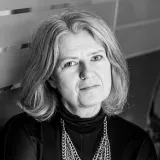Please note: this event has passed
Words cannot always convey experience, thought and feeling. In this performance contemporary dancer Anna Spink interprets data from RADAR-CNS, a research programme that explored the potential of wearable devices to help measure and predict clinical outcomes in depression, Multiple sclerosis and epilepsy. Anna wears a medical device that tracks movement, pulse and electrodermal activity and these biometrics write the music live in ambient electronica.
The NIHR Maudsley Biomedical Research Centre and the Digital Futures Institute are delighted to ask you to join us for this pioneering production offering insights on mental and physical health conditions, focusing on depression, epilepsy and multiple sclerosis – conditions that come with their own changing patterns, or “feedback loops” – where a lot of symptoms are invisible.
This event is part of the Seeking Connection: Living Well with Technology exhibition events programme. Prior to the performance, attendees are invited to view the exhibition in the Arcade, Bush House. Following the performance we will bring together colleagues from the Faculty of Arts and Humanities and the Institute of Psychiatry, Psychology and Neuroscience to discuss the performance and the wider context of the arts, technology and mental health. The event will conclude with a short drinks reception in the Somerset Room.
1800 Arrive (Chapel)
1815 Performance
1845 Discussion panel: exploration of the different relationships between the arts and technology in the area of mental health. Panel Members: Sally Marlow (Chair), Steven Connor, Fay Bound Alberti, Richard Dobson, Alina Ivan, Anna Spink
1930 Networking drinks (Somerset Room)
2030 End
Fay Bound Alberti is Professor of Modern History in the Department of History, Faculty of Arts and Humanities; and the Director of the Centre for Technology and the Body, King’s College London. She researches the histories of the body, medicine, emotion and gender, and in 2019 was awarded one of the first UKRI Future Leaders Fellowships to study the history and meanings of facial transplantation. Her second UKRIFLF-funded project, Interface, examines the face as a mediator between subjective and social worlds.
Patrick Burke was part of the RADAR-CNS Patient Advisory Board (PAB). The PAB was created to ensure that the views of people with depression, MS and epilepsy conditions were incorporated into RADAR-CNS. Patrick lives with secondary progressive multiple sclerosis (MS).
Steven Connor, who has previously held posts in Birkbeck College, London and the University of Cambridge, is Professor of Living Well with Technology in the Department of English, Faculty of Arts and Humanities; and Director of Research, Digital Futures Institute, King’s College London. He is the author of many works relating to the psychocultural history of technology and media, especially Dumbstruck: A Cultural History of Ventriloquism (2000), Dream Machines (2017), Living By Numbers: In Defence of Quantity (2017), Dreamwork: Why All Work is Imaginary (2023) and Styles of Seriousness (2023). He is currently writing a book about exaggeration.
Richard Dobson is Professor of Medical Informatics at the IoPPN, Theme Lead for Informatics at the NIHR Maudsley Biomedical Research Centre, and Professor of Biomedical and Health Informatics at the Institute of Health Informatics, UCL. He also co-chairs the Centre for Translational Informatics (CTI), a partnership between university and healthcare sectors to facilitate the realisation of innovative healthcare applications.
Alina Ivan is the creator and producer of Feedback Loops. With a background in mental health and tech, Alina uses interdisciplinary approaches to raise awareness of intimate stories that can be hard to understand through words alone. She has a keen interest in using tech to build empathy and human flourishing and creating cultures of wellbeing. Her work expands across mediums: science shows, animation, writing, and podcasting. Alina worked on the Depression work package for RADAR-CNS while at King’s College London.
Sally Marlow (Chair) is Associate Dean for Impact, and Professor of Practice in Public Understanding of Mental Health Research at the Institute of Psychiatry, Psychology and Neuroscience. She is also a BBC Broadcaster, regularly developing and presenting documentaries on mental ill health for BBC Radio 4 and the World Service, and was recently Researcher in Residence at BBC Radio 3.
Anna Spink is a contemporary dance artist, specialising in multidisciplinary collaboration and composition. Spink views life as an intricate dance: with movement a fundamental instrument of curiosity, exploration, discovery, connection and expression. Fascinated by the vulnerable and intuitive immediacy of improvisation, Spink finds it an important choreographic tool for developing authentic and introspective movement vocabulary.
Dan Wimperis is a musician and data scientist/mathematician. In recent years, Dan has been focussing on building generative musical systems. He has applied the techniques that he has developed over these years to the Feedback Loops project, adapting the input to generate biometric data and tailoring the generative system to work with bodily movements representing experiences of illness.
Booking information
This symposium is free and open to all; to register please visit our Ticket Tailor page. If you book a ticket but find you are unable to come to the event, please kindly cancel your booking.
This event is wheelchair accessible. This event may be filmed and photographed, by attending you consent to appearing in any footage or stills of the event. To inform the organiser of any access or dietary requirements, please email digitalfutures@kcl.ac.uk.
This event is supported by the NIHR Maudsley Biomedical Research Centre and the Digital Futures Institute.

Event details
ChapelKing's Building
Strand Campus, Strand, London, WC2R 2LS


